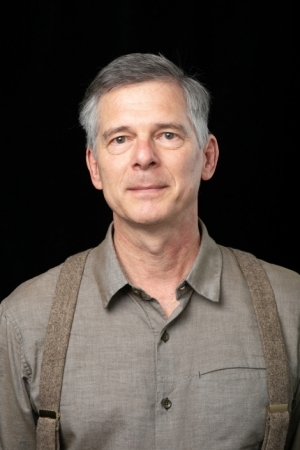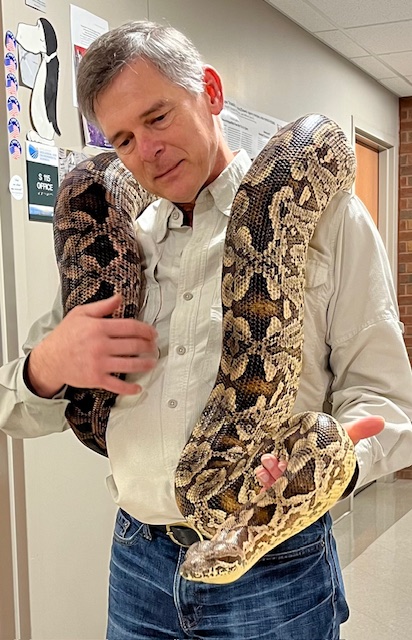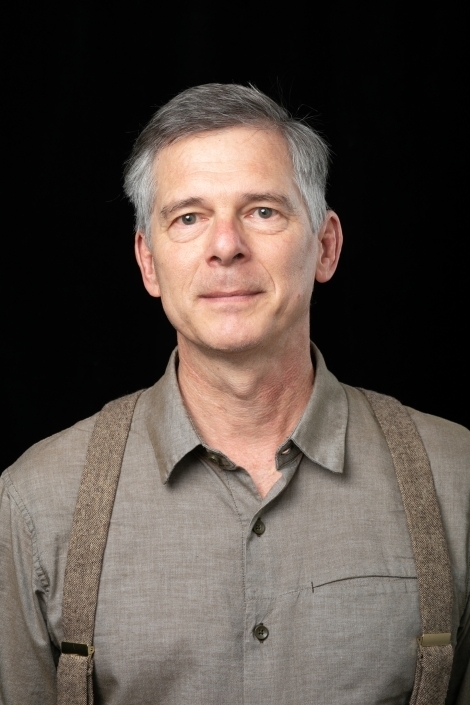By: Teagan Jones and Dr. Vicky Klima
Since Fall 2022, Dr. Mark Venable has served as the Honors College academic mentor for students pursuing majors in the Department of Biology. Dr. Venable, professor in the Department of Biology, began working at Appalachian State in Fall 1996.
In the Fall semester 2017, Dr. Venable taught an Honors College first-year seminar titled Myth, Reality, and the Wonders of Nature, which he developed as a UCO 1200 critical thinking course. He has since taught HON 1515: Myth and Reality regularly and will teach the course in the upcoming Fall 2024 semester. He shared, “I developed this course to help first-year students become more aware of how people’s minds work, become more cautious about the certainty with which we know things, and become more aware of cognitive skills that can better help us get to the nature of reality. I decided to focus on stories (myths) that people have told over the millennia to explain natural phenomena. Myth and Reality explores topics from vampires, krakens, and hollow Earth to pareidolia, cognitive biases and the scientific method.” During class, “students read, hear, and watch myths and their deconstruction, and then talk in small groups about everything from the details of the story to the logic behind it. They also develop skills in writing and speaking through assignments.”
Dr. Venable shared that he was first interested in becoming an Honors College academic mentor because,
I love working with young people. There is so much energy and hope and that can be infectious. With so many choices in life, it can be mind-numbing to choose a career and major. I feel it is important to help students find their own way…Many students are in college because that is just what one does after high school. Honors students are here to accomplish things and prepare for a future making a difference in the world, and I love being a part of that.
Honors College academic mentors play a crucial role in fulfilling our Honors College mission to support students’ individual holistic development and engagement beyond themselves, across disciplinary boundaries, and in collaboration with others. Honors College mentors empower and engage students by collaborating with them to:
- Strategically navigate the Honors curriculum, major decisions, and general education choices to explore and define personal and professional long-term goals, including plans for post-graduate education or employment.
- Identify and pursue co-curricular and extra-curricular opportunities to further refine and achieve their goals.
- Become leaders, healthy, well-balanced community members, and engaged local-global citizens.
About Dr. Venable, Interim Dean Dr. Vicky Klima shared,
“Last fall, Dr. Venable donated our only Honors College plant, located at the top of the stairs as you enter App Hall. Initially, the plant’s health declined under my care. However, with Dr. Venable’s patience, kind coaching, and Victoria Kovtun’s assistance, the plant is now thriving. Dr. Venable extends this same patience and guidance to our Honors College students majoring in biology. He recognizes when his students need extra support and connects them with the right people and opportunities to help them thrive. His passion for biology and dedication to his students are evident in all he does, and I’m grateful that our students benefit from both.”
Honors College mentors begin working with students before they arrive on campus, partnering with them at their Honors Orientation to develop plans for completing their undergraduate requirements, including majors, minors, and general education. Honors College advising is unique in that advisors support their students for the entire duration of their time at Appalachian. Even after they declare their majors, mentors continue to guide students through University Honors requirements such as interdisciplinary coursework, international education, and the completion of their Honors thesis.
Dr. Venable finds advising very rewarding, and stated:
It is amazing to witness the development of an incoming freshman into a college graduate. It is very rewarding to see students achieve in college and then go out into the ‘real world’ or to graduate school and achieve even more, and know that you played some small role.
Furthermore, he stated, “Doing college is not just about taking classes. There is career preparation, research, clubs and sports, social and cultural activities, study abroad, mental and physical health, the Blue Ridge mountains, oh, and somewhere in there, eating and sleeping. In departmental advising, we talk about all these things, but the demand of time does not allow for in-depth conversation and planning. As an Honors College mentor, I get to know my advisees as whole students.”
Many Honors College mentors are also faculty members in their advising area, teaching one course fewer than they would otherwise and reassigning that time to Honors College mentoring. As established professionals with terminal degrees, Honors College mentors are well-connected in their fields and best-positioned to understand available opportunities. Their professional expertise and experiences, combined with the personal relationships they develop with students, allow them to connect each student with international programs, internships, research experiences, and leadership opportunities that specifically support that student’s success.
Dr. Venable completed his research fellowship at the Center for Aging and Human Development at Duke University, his postdoctoral fellowship at the Cardiovascular Research Training Institute at the University of Utah, his Ph.D. in biochemistry at Wake Forest University and his bachelor’s degree in chemistry at Western Carolina University. In the biology department, Dr. Venable began teaching cell biology with a lab that has since become a core class in the cellular and molecular biology major. He has also taught courses including Biology of Aging, Introductory Biology, Environmental Toxicology, and a capstone course, Current Controversy in Biotechnology.
Dr. Venable’s research focuses on two areas. First, he is looking to “find a serum ‘factor’ that inhibits an enzyme, phospholipase A2, in pit viper venom.” He is “working to purify this and determine the chemical structure” in hopes that the enzyme might aid in snake bite treatment and work as an anti-inflammatory compound. His second area of research pertains to biofuels. He “has been working for years to develop algae as a third-generation biofuel.” He explained that his current research project focuses on “growing algal biomass and then digesting it anaerobically to produce biogas (methane) that can be used to produce electricity.” He shared that, “This is not a new idea, but I am working on improving the process to make it more productive.”
Dr. Venable has had “quite a few” Honors College students join his research team and he has directed many students in their thesis research. When students come to him with a research interest, he collaborates with them to discuss the goals, the scope of the project, and the possible roles within that. About the collaborative faculty-student research process, he shared “When they start, we spend time practicing the research techniques involved. We then design experiments and discuss how to keep a notebook. After each experiment, we go over the results, and if there are problems, we try to find solutions and then repeat…I try to give students as much freedom as I can, encouraging them to be creative and self-motivated. Sending them the final published thesis book is very rewarding.”
Dr. Venable has received research funding from the National Institutes of Health, the National Science Foundation, the American Heart Association, and the Environmental Protection Agency. He advises students looking to pursue work in the research field “ to learn as many techniques as they can.” He offers the following advice for students hoping to acquire similar funding: “You will be at the height of your career in 15 years. I suggest that you look at where the field is likely to be, and then train for that. I encourage students to apply for internal grants as practice and most do get one or even two. It is critical to able to convince others of the importance of your research if you are to get the resources you need.”
Outside of mentoring, teaching and research, Dr. Venable “tries to make time in his busy schedule to hike mountaintops and creeks, catch more brookies than trees, turn logs into bowls or spoons, and read something that’s not academic.” He is also “part of the Heterodox community, working to counter orthodox and divisive tendences in our universities and communities, and encouraging more nuanced thinking.”


